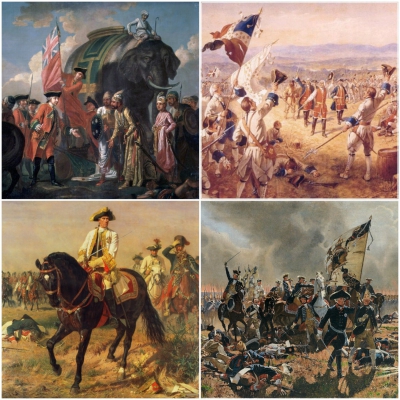The Battle of Hochkirch took place on 14 October 1758, during the Third Silesian War (part of the Seven Years' War). After several weeks of maneuvering for position, an Austrian army of 80,000 commanded by Lieutenant Field Marshal Leopold Josef Graf Daun surprised the Prussian army of 30,00036,000 commanded by Frederick the Great. The Austrian army overwhelmed the Prussians and forced a general retreat. The battle took place in and around the village of Hochkirch, 9 kilometers (6 mi) east of Bautzen, Saxony.
Historians generally consider the battle as among Frederick's greatest blunders. Contrary to the advice of his subordinates, he refused to believe that the typically cautious Austrian commander Leopold von Daun would bring his troops into battle. The Austrian force ambushed his army in a pre-dawn attack. Over 30% of Frederick's army was defeated; five generals were killed and he lost his artillery park and a vast quantity of supplies. Although Daun had scored a complete surprise, his attempt to pursue the retreating Prussians was unsuccessful. The escaped force united with another corps in the vicinity, and regained momentum over the winter.
The Seven Years' War (1756–1763) was a global conflict between Great Britain and France for global pre-eminence. In Europe, the conflict arose from issues left unresolved by the War of the Austrian Succession (1740–1748), with Prussia seeking greater dominance. Long-standing colonial rivalries pitting Britain against France and Spain in North America and the Caribbean islands were fought on a grand scale with consequential results. In Europe, the war broke out over territorial disputes between Prussia and Austria, which wanted to regain Silesia after it was captured by Prussia in the previous war. Britain, France and Spain fought both in Europe and overseas with land-based armies and naval forces, while Prussia sought territorial expansion in Europe and consolidation of its power.
In a realignment of traditional alliances, known as the Diplomatic Revolution of 1756, Prussia became part of a coalition led by Britain, which also included long-time Prussian competitor Hanover, at the time in personal union with Britain. At the same time, Austria ended centuries of conflict by allying with France, along with Saxony, Sweden and Russia. Spain aligned formally with France in 1762. Spain unsuccessfully attempted to invade Britain's ally Portugal, attacking with their forces facing British troops in Iberia. Smaller German states either joined the Seven Years' War or supplied mercenaries to the parties involved in the conflict.
Anglo-French conflict over their colonies in North America had begun in 1754 in what became known in the United States as the French and Indian War, a nine-year war that ended France's presence as a land power. It was "the most important event to occur in eighteenth-century North America" prior to the American Revolution. Spain entered the war in 1761, joining France in the Third Family Compact between the two Bourbon monarchies. The alliance with France was a disaster for Spain, with the loss to Britain of two major ports, Havana in the Caribbean and Manila in the Philippines, returned in the 1763 Treaty of Paris between France, Spain and Great Britain. In Europe the large-scale conflict that drew in most of the European powers was centered on the desire of Austria (long the political centre of the Holy Roman Empire of the German nation) to recover Silesia from Prussia. The Treaty of Hubertusburg ended the war between Saxony, Austria and Prussia, in 1763. Britain began its rise as the world's predominant colonial and naval power. For a time France's supremacy in Europe was halted until after the French Revolution and the emergence of Napoleon Bonaparte. Prussia confirmed its status as a great power, challenging Austria for dominance within the German states, thus altering the European balance of power.

1758Oct, 14
Seven Years' War: Austria defeats Prussia at the Battle of Hochkirch.
Choose Another Date
Events on 1758
- 21May
French and Indian War
Ten-year-old Mary Campbell is abducted in Pennsylvania by Lenape during the French and Indian War. She is returned six and a half years later. - 12Jun
Siege of Louisbourg (1758)
French and Indian War: Siege of Louisbourg: James Wolfe's attack at Louisbourg, Nova Scotia commences. - 26Jul
Siege of Louisbourg (1758)
French and Indian War: The Siege of Louisbourg ends with British forces defeating the French and taking control of the Gulf of Saint Lawrence. - 25Aug
Battle of Zorndorf
Seven Years' War: Frederick II of Prussia defeats the Russian army at the Battle of Zorndorf. - 14Oct
Battle of Hochkirch
Seven Years' War: Austria defeats Prussia at the Battle of Hochkirch.

 English
English  español
español  français
français  português
português  русский
русский  العربية
العربية  简体中文
简体中文 